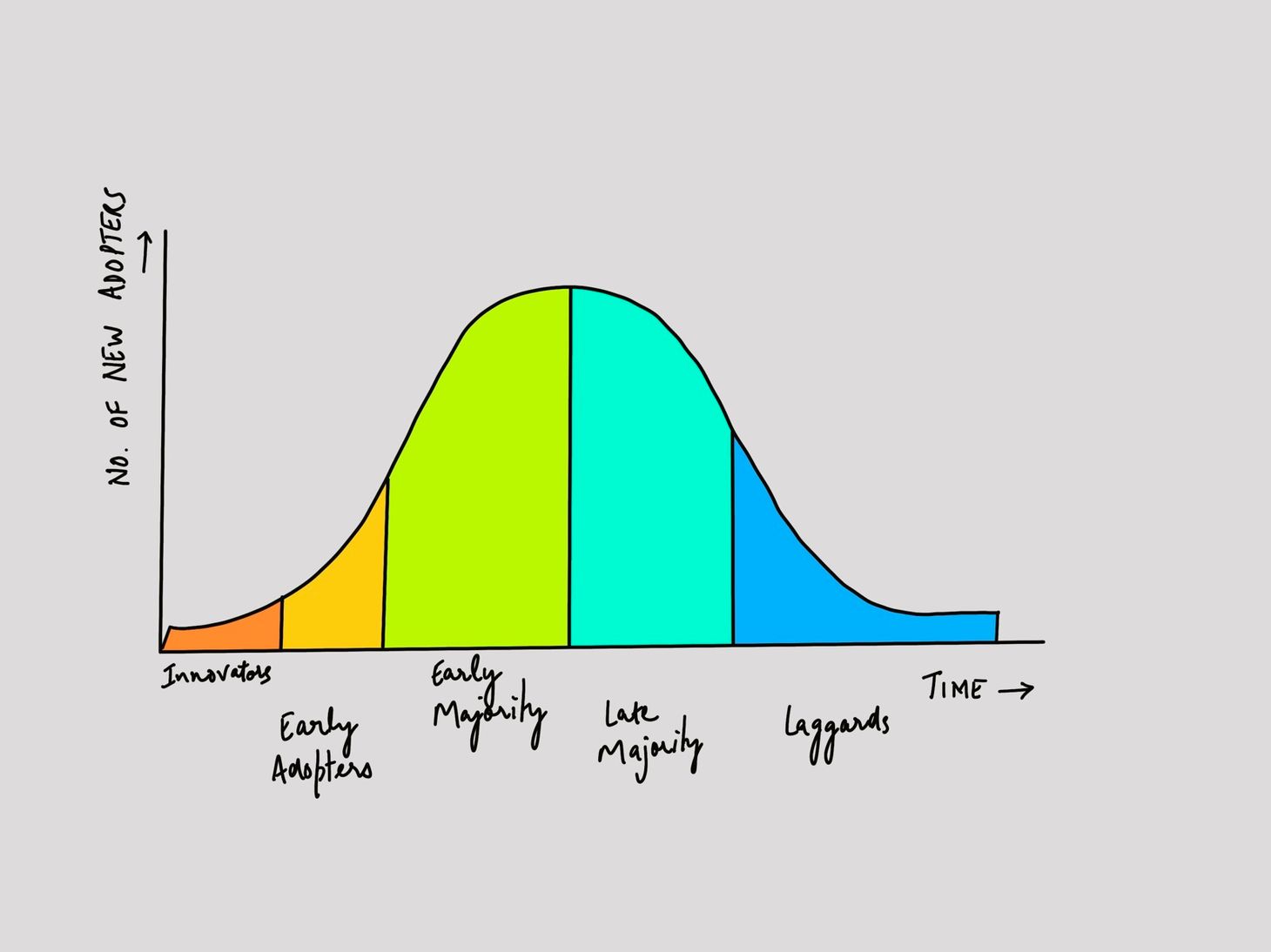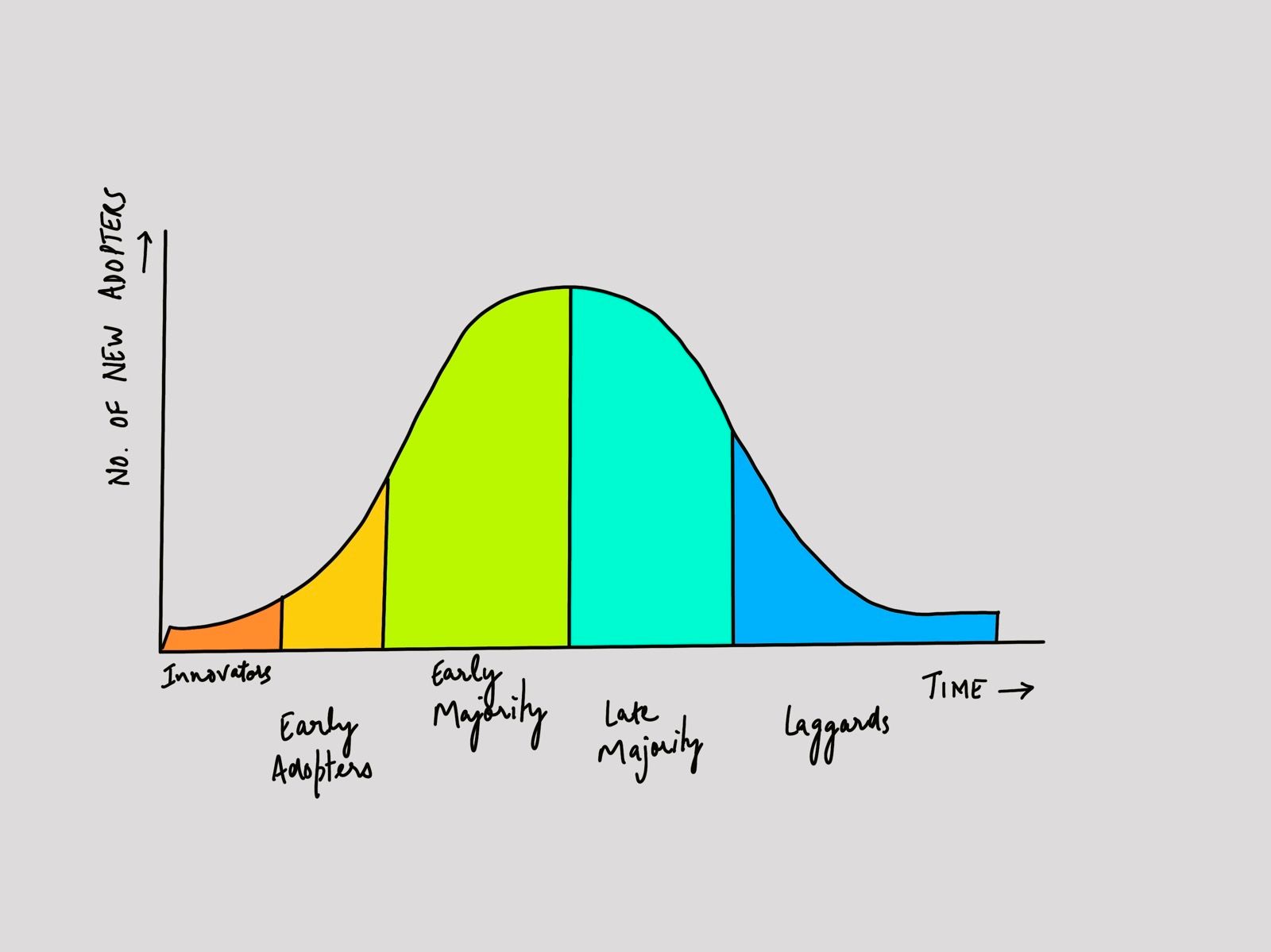The Future of Technology: AI, ML, & IoT
Taking a look at Artificial Intelligence, Machine Learning, and Internet of Things

Table of Contents
Hey there!
All of us have heard spiels on how technologies like — Internet of things (IoT), Artificial Intelligence (AI), Machine Learning (ML) — are changing life as we know it. Today, let’s take the time to understand them.
This article is for:
- Investors trying to understand how these technologies would affect their portfolio companies; and aid in their assessment of new investment opportunities.
- Entrepreneurs looking to start a new business or transform an existing one.
- Learners, curious to learn about transformative technologies.
If you’re one of the above, read on. :)
Since time immemorial, humans have created tools that simplify their daily tasks. These potent-new-fancy-things are broadly called as technology. New technologies take their own time to be accepted en masse — this is understood well through the Technology Adoption Curve.

By the time a particular iteration of technology has become mainstream, it becomes ineligible of being called by the pristine word that is 'technology'. The definition of which then shifts to something that lies in the future, and hence enthralls.
Nowadays, none of us think of a lightbulb or a bicycle as technology. In fact these have become similes for describing the next layer of technology on the horizon. Here's a video of Steve Jobs comparing computers (technology of today / the time this video was made) to a bicycle (technology of the 1800s).
"I remember reading an article when I was about 12 years old (I think it might have been Scientific American) where they measured the efficiency of locomotion for all these species of planet Earth. How many kilocalories did they expend to get from point A to point B, and the Condor (a kind of vulture) won. Came in at the top of the list; surpassed everything else. And humans came in about a third of the way down the list which was not such a great showing for the crowd of creation. But somebody there had the imagination to test the efficiency of a human riding a bicycle. A human riding a bicycle blew way the Condor all the way off the top of the list.
It made a really big impression on me, that we humans are tool builders, and that we can fashion tools that amplify these inherent abilities that we have to spectacular magnitudes. So for me, the computer has always been a bicycle of the mind, something that takes us far beyond our inherent abilities. And I think we're just at the early stages of this tool, very early stages. And we've come only a very short distance, and it's still in its formation but already we've seen enormous changes I think that's nothing compared to what's coming."
The word 'technology', thus has a shifting definition. It lives by latching onto a new wave of change which promises to have a big impact on human life. Now lets look into what's on the horizon.
What next?
New buzzword technologies like - AI (Artificial Intelligence), ML (Machine Learning) and IoT (Internet of Things) are natural progressions to the proliferation of well entrenched technologies like — computers, smartphones, and the internet.
Artificial Intelligence
Intelligence is the capacity to behave logically; a capacity that humans are naturally endowed with. In turn, we humans have always yearned to embed some sort of intelligence in our surroundings. We've had small wins along the way, but now, the collective efforts have started bearing fruit, and AI is truly invading many facets of our lives.
When a geyser stops heating water once it reaches a particular temperature - the geyser displays a limited level of intelligence - that's AI. When a smoke detecting water sprinkler comes on upon detecting smoke, AI again. When you type "wierd" and it auto-corrects to "weird", AI. When you're typing "iPhone 12 price..." and google makes "... in India" appear, that's AI too.
Wherever a non-human displays a level of intelligence, you should know that it's artificial intelligence. From face recognition to digital assistants, to maps apps and chat bots... they're all manifestations of AI.
All these are specific use cases of AI. What they can do is defined within clear bounds. But what about a general-use-case-AI? Can I ask an AI to conduct research from the internet for STEBI's next article? Maybe even write the article for me? Well, if you read up on OpenAI's GPT-3, you'll know that this is already possible. It's not perfect, but it definitely astoundingly good, and more than a little scary. Here's a link to an article written by GPT-3.
Machine Learning
Machine Learning is what feeds AI. If AI is the output, ML is the input. When a machine takes data as input, and learns to make sense of it, that's ML; when it uses it in a productive way, that's AI.
When Instagram notices that you like, view, and bookmark content from 'Friends' (the TV show), it keeps on showing clips and memes from it in your discover feed. Instagram learning what you like is machine learning, and it showing you more of that is artificial intelligence.
When you get hundreds of emails from MakeMyTrip, and always delete them without opening, Gmail starts marking these as spam. Again both ML and AI are at play. ML to notice and learn your repeated behaviour, and AI to act accordingly.
Facebook predicts the friend in your photo even before you tag them, how? image recognition software. An image recognition software is a machine learning program that observes a lot of data, and then categorises it meaningfully.
Various other applications like speech recognition, medical diagnostics, even technologies like hawk eye (used in the game of cricket to assist an umpire in their decision making) — are all combinations of ML and AI.
Internet of Things
In my opinion, the internet is the single greatest invention of recent times. Immense amounts of iterative technological advancement has naturally progressed from the advent of the internet. But until recently, internet was available for access only to humans (I know that sounds ridiculous, bear with me). With chips, screens, sensors, and battering getting so good, new kinds of devices have become possible. And that leads to 'Internet of Things'.
IoT is just the ability of many devices (and sensors) to connect to the internet, in order to do something of value for its user. How do they do that? ⇒ IoT brings more kinds of data to the software. The software uses ML to make sense of it. And then AI does something useful based on this learning.
A weighing machines can connect to your WiFi (this is IoT) and sync your daily weight to the cloud. When this information is compared to that lying in the health databases maintained by the company. Any abnormality can be brought to the notice of the user, and suggestions can be made on the same.
Baby monitors and smart home devices (like coffee makers and refrigerators) too come under the same family. A use case I've heard about a lot is the coffee maker switching on when the alarm rings.🤷🏻♂️
Self driving cars (a car that is driven by a software, not a human driver) too make use of such IoT sensors placed around the body of the car. These connect to a central software through the cloud. Data from each software-driven-trip allows for better machine learning, and hence a better software-car-driver (AI).
What's the big deal?
When manufacturing was revolutionised during the industrial revolution through high-tech machinery, blue collar jobs took a hit. Now, with AI becoming increasingly capable, white collar jobs are under threat. The go-to argument most people have been making is that humans would then focus on creating, since computers cannot master creativity. But, as you would've noticed in the GPT-3 example above, machines have gotten there as well.
So, what is the future of work?
It's hard to say. I worry more about its implications though. The economy is a system that rewards work. Despite its flaws, it rewards those who continuously do good work. I wonder whether any avenues would be left for those with lesser economic means to climb up the economic pyramid. These developments also make one wonder about the future of the human race and topics like universal basic income... but we'll leave them for another day.
For now, I'll leave it on the note that, through time humans have always prevailed. I'd bet that our finer abilities will allow us to continue to thrive in an increasingly technological world.
I hope you enjoyed reading this article, and that you have a better understanding of AI, ML and IoT now. :)
I'll see you next week. ✌🏼
Stebi Newsletter
Join the newsletter to receive the latest updates in your inbox.

